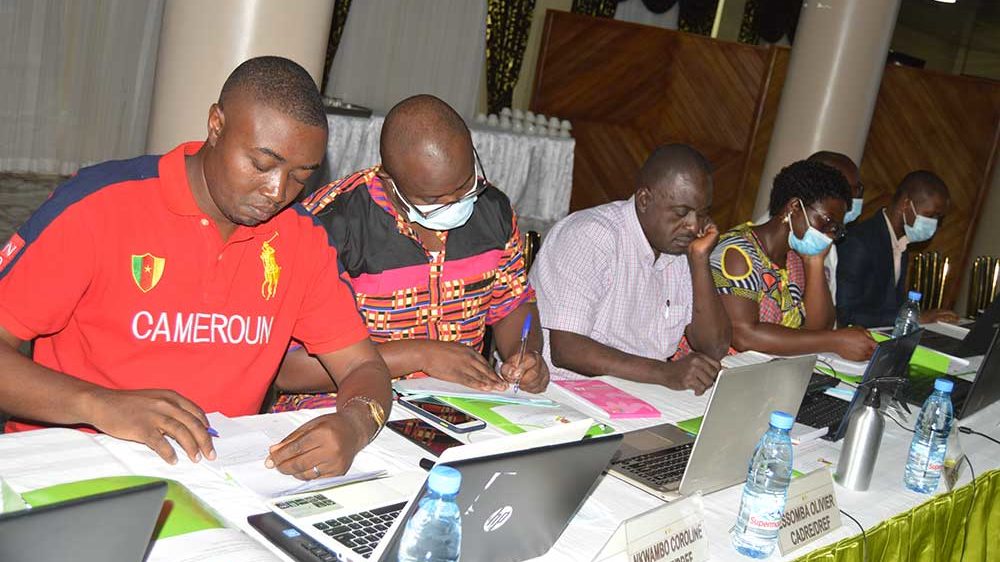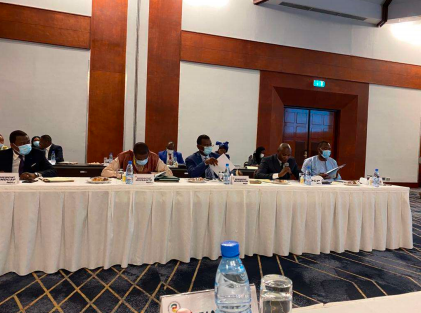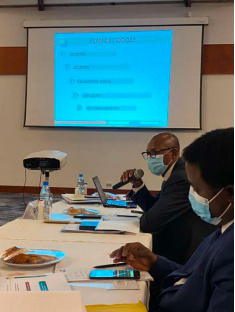On Tuesday 08 June 2021, the Director General of Budget, Mr Cyril Edou Alo’o, chaired the coordination meeting of regional financial controls (RFC). The agenda covered four (4) main points, namely: the execution of the budget of the regions for the first semester, the feedback of budgetary information, the internal management of services and the difficulties encountered.
With regard to the execution of the regions’ budget, it was observed that the misinterpretation of the latest general regulations on public accounting leads to differences in the data used to report budgetary information. In fact, the municipal receivers believe that they are the ones who must report the information, and this is in addition to what the financial controller consolidates for transmission. This dysfunction tends to inflate the figures and distort the system for reporting budgetary information. On this subject, the Chairman of the meeting asked the Regions to monitor these operations and to inform the Paymaster General (TPG), if necessary.
As far as information feedback is concerned, the option adopted is to send teams to collect the databases which must be centralised in the IT Division. To facilitate this work, it is planned to create access keys in the servers to collect the information, but until the relevant file is validated, the collection is done in the field with the collaboration of the FCRs.
With regard to the internal management of the services, the problem of the competences and coordination of the activities of the Regional Control Brigades in the FCRs was mentioned.
The difficulties encountered are both general and specific. In general, the financial controllers noted
– the instability and/or obsolescence of the servers
– the recording of expenses in the CADRE software without them being authorised. This poses a problem of collaboration between PROBMIS and CADRE and of accurate reporting of budget information. The Head of the Informatics Division nevertheless noted the problem linked to the autonomy of the PROBMIS system;
– the lack of financial resources for organising meetings with departmental financial controllers to ensure coordination of budget execution in the region. In this regard, the Division of Budgetary Control, Audit and Quality of Expenditure (DCOB) reassured the regions of the measures that are being taken to facilitate this activity;
– the transmission of PROBMIS files to the General Treasury (TG) as well as the computer processing of Irrevocable Transfer Attestations (IVA);
– Capacity building of staff working in regional financial control.
At the end of the meeting, the following recommendations were made
To the technical team in charge of preparing the meetings
– To the technical team in charge of preparing the meetings: – to prepare the next meetings by identifying the summary situation of the problems in each region as well as the budgetary information.
To the IT Division
– Correct the problem of budget information being fed back into PROBMIS, which is only done by assigning accounting post. To do this, a “financial control” field must be added;
– Ensure that all financial controllers who do not have PROBMIS but who process expenditure on delegated appropriations in this system have accounts to perform the tasks;
– Reviewing the progress of work on budget information feedback (signature of the instruction);
In the Budgetary Control, Audit and Quality of Expenditure Division
– To take into account the regional control brigades in the training plan for DCOB staff
To regional financial controllers
– Facilitate meetings at regional level with the departments;
– Prepare the elements for the next meeting (budget execution, budget information feedback, etc.);
– transmit the activity reports within the regulatory deadlines.
The Minister of Finance, Louis Paul Motaze has signed an important circular on the Certificates of Irrevocable Transfer. Indeed, since May 4, 2021, the Minfi has designated officials able to sign computerized and secure CITs in the central administration and in the decentralized structures of the Ministry of Finance.
Henceforth, payroll inspectors are empowered to sign CITs in the central administration as well as regional financial controllers in their respective regions.
This is part of the implementation of the “AVI” application for the production of computerised and secure irrevocable salary transfer certificates.
As a reminder, on September 17, 2020, the Minister of Finance already specified the modalities of organization, operation and monitoring-evaluation of the production of the AVI. With this new platform, Minfi is deconcentrating the production of AVIs to the regions and the central administration.
From now on, we will all be able to create and publish our articles on the DGB website.
CCCB
It is with these words that Mrs. MEKIA Félicité Linda, Head of the Budget Accounts Consolidation Unit, representing the Director General of the Budget, opened the training session.

With the support of ST Digital, the thirty or so staff in charge of the site’s animation were edified on various points such as the general functioning of the site, organization of articles, writing and publishing one’s first article, organization of archives, and management of modules and maintenance of the internet site.
Through this training, the DGB is laying the foundations for the appropriation of the administration of the site in accordance the law of transparency and good governance in Cameroon’s public financial management which provides in its section 50 : “All information and documents on public finances, (…), shall be published by the competent institutions on their websites once they are available”.
From April 29 to May 20, 2021, an IMF/ARITAC team of experts conducted a technical assistance mission to Cameroon led by the Public Finance Department (FAD). The purpose of this assistance mission was to support the Cameroonian authorities in strengthening the budgetary and financial governance of the decentralization process, managing the associated risks, and improving financial relations between the state and the decentralized local authorities (DLA).
This mission was led by Mr. Jean Luc Helis, Senior Economist at the ADF. Given the current global situation, several meetings were held by videoconference with a panel of stakeholders based in the Central and Southwestern regions.
The objective of this mission was to collect information inherent to the implementation process of decentralization, the budgetary and financial management of the CTDs and to understand their interactions with the State in order to propose adequate measures and improve the governance of the CTDs.
It aims to support Cameroon in the implementation of financial decentralization.
The Minister of Finance, Mr. Louis Paul Motaze signed an important press release on April 28, 2021. In this communiqué, MINFI invites pensioners who have benefited from pension arrears and who did not show up at the first convocation of September 10, 2020 to report to their respective banks in the regional capitals. To this end, the pensioners whose names follow below this article, are requested to present themselves during the period from Monday, May 24 to Friday, July 16, 2021, from 7:30 a.m. to 3:30 p.m. with the following supporting documents as appropriate:
From Monday, April 26 to Friday, April 30, 2021 was held in the conference room of the Hotel LA FALAISE in Yaoundé, the workshop for the co-construction of tools for the operationalization of the Gender Responsive Budgeting (GRB).
Co-chaired by Mrs. Sophie BOUMSONG, Head of the Budgetary Reform Division and the joint team of experts from the Public Finance Department of the IMF/AFRITAC Centre, this meeting was attended by several administrations such as MINFI, MINPROFF, MINSANTE, MINEDUB, MINEPAT, MINDDEVEL, MINADER, UN-WOMEN, GIZ, the Civil Society as well as staff from the Budgetary Reform Division
The objective of the workshop was to contribute to the development of tools for the operationalization of gender budgeting.
The restitution session of the aforementioned mission coupled with workshops for the co-construction of tools for the operationalization of Gender Responsive Budgeting (GRB) was based on five (05) main themes, namely
The workshop also examined the entry points for gender in the budget cycle in Cameroon. The aim was to consolidate the uniqueness of the budget cycle, to introduce the gender perspective in the preparatory phase, to integrate the gender prism in the medium-term macro-budgetary programming and to prepare a budget with guaranteed gender sensitivity. The Ministry of Finance, through the Directorate General of the Budget, plans to implement gender budgeting as of the 2022 budget year with certain pilot administrations. To this end, the elaboration of the Medium Term Expenditure Framework (MTEF) will integrate the gender perspective at all stages of the budget cycle, which will thus represent important entry points for GRB and will therefore have gender sensitive programs, objectives and indicators.
At the end of the workshop, some recommendations were made. They are :
On April 15, 2021, was held in the conference room of the Hotel des Députés in Yaoundé, an official opening ceremony for the training of trainers who will be involved in the dissemination of the Citizen’s Budget 2021 in the Decentralized Territorial Communities of Cameroon.
This ceremony was organized by the Institute of Higher Studies on Territorial Governance and Decentralization which participates in the dissemination of concepts relating to transparency in public finance management in Cameroon. In addition to the officials of the said Institute, officials of the Ministry of Finance, deputies and senators of the Department of Kadey, expert trainers, trainers and journalists from the national media and press took part.
In his introductory remarks, the Director of the Institute of Higher Studies on Territorial Governance and Decentralization indicated that his institute has undertaken and committed itself to disseminate the Citizen Budget 2021 throughout the national territory starting with the Department of Kadey in the Eastern Region. This dissemination will be launched in Batouri during the Rural Entrepreneurship Forum of Kadey scheduled from 28 to 29 April 2021 to encourage the general public to participate in the wide dissemination of the document.
Taking the floor, the Representative of the Ministry of Finance Mrs. MEKIA Félicité Linda, Head of the Unit for the Consolidation of Budgetary Accounts of the General Directorate of Budget made a point of specifying that the citizen budget is a simplified budgetary document to facilitate the understanding of non-specialists with a view to improving citizens’ access to budgetary information. Through this initiative, she continued, the Government is applying Article 49 of Law No. 2018/011 of July 11, 2018 on the Code of Transparency and Good Governance in the Management of Public Finances in Cameroon. Thus and in continuity with previous editions, the third publication of the citizen budget informs the population on the main orientations of the 2021 budget. It highlights the data and information useful for the calculation of the budget, the resources and expenses of the State as well as the provisions of the finance law, particularly those related to improving the quality of life of the population. In addition, this Citizen’s Budget aims to inform citizens about the macroeconomic and budgetary framework, the new tax provisions, the main priorities of public spending as well as the debt situation for the year 2021.
To close this ceremony, the Representative of MINFI proceeded to the symbolic handing over of the didactic training kit to the head of the Institute of Higher Studies on Territorial Governance and Decentralization.
The Joint Order N°000031/AC/MINDDEVEL/MINFI of 03 March 2021 establishing the Budgetary Calendar of Regional and Local Authorities is available.
It determines and highlights the major annual stages of preparation, voting and approval of the budgets of Regional Councils, Town Councils and Councils. The decree also identifies the actors and structures responsible for these stages and recalls the key dates of the process of preparing the said budgets by establishing the calendar of the main related activities.
In accordance with this decree, it is the Secretary General of Regional and Local Authorities who ensures the coordination of the preparation of the draft budget, under the authority and responsibility of the head of the executive body. To this end, the budget of the local authority results from its development priorities as defined in its planning documents, and is aligned with the strategic orientations of the State. It is part of a medium-term budgetary framework and programming approach. Thus, the preparation of the following year’s budget is part of a continuous process that begins on 1 January of the current year and ends with its approval during the current year.
The process of preparing the budget of the Regional and Local Authorities which ends with its approval comprises four (04) phases, namely:
From 15 to 19 March 2021, the 5th training session for Financial Controllers was held at the Yaounde Hilton Hotel. This seminar is part of the continuity of a series that started in 2020 and at the end of which nearly 111 Financial Controllers were trained on modules that take into account the trend in their functions and the institutional specificities of the structures to which they are assigned.
The meeting was chaired by the Head of the Budget Control, Audit and Expenditure Quality Division, representing the Director General of the Budget, who was unavoidably absent. In her introductory remarks, she recalled the objectives underlying this activity which started in 2020, namely:
The Yaounde meeting thus made it possible to present the thirteen (13) training modules ranging from the general framework of public finance management to ethics in the execution of public budgets, moving successively through the role of the FC in the PPBS chain; budget nomenclature of the State, PE and RLA; taxes and levies in the budget procedure; role of the FC in public contracts; optimal use of GIDOEP; internal control in public bodies; control of salaries and pensions; actors and tools for performance management; administrative drafting and archiving in a FC; budgetary procedures and reporting of activities in a FC and preparation of public budgets.
At the end, the following recommendations were made to MINFI:
The third session of the steering committee of the second phase of the Financial Governance Support Project was held on Thursday 1 April 2021 at the Hilton Hotel.

Chaired by the Director General of the Budget, the work and discussions of this session mainly dealt with the follow-up of the recommendations of the steering committee of 24 June 2020, accounting reform project, evaluation of the implementation of the PTAB 2020, presentation and validation of the PTAB 2021. Finally, the adaptation of information systems remains the main subject of concern. The DSI presented the progress level to the committee.

With nine months to go before the switch to accrual accounting, all efforts must be concentrated on the work led by the ad hoc committee on IS adaptation. A progress report is planned for September 2021 to present the progress level to members of the steering committee.